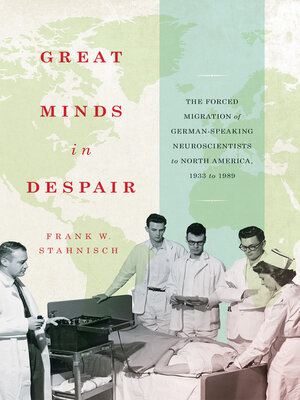Great Minds in Despair
ebook ∣ The Forced Migration of German-Speaking Neuroscientists to North America, 1933 to 1989 · McGill-Queen's/AMS Healthcare Studies in the History of Medicine, Health, and Society
By Frank W. Stahnisch

Sign up to save your library
With an OverDrive account, you can save your favorite libraries for at-a-glance information about availability. Find out more about OverDrive accounts.
Find this title in Libby, the library reading app by OverDrive.



Search for a digital library with this title
Title found at these libraries:
| Library Name | Distance |
|---|---|
| Loading... |
The twentieth century witnessed two devastating world wars that led to the exodus of millions of people. Counted among them were hundreds of neuroscientists and biological psychiatrists from Nazi Germany and its surrounding countries who were forced to emigrate in the 1930s and 1940s. Many of them settled in North America, where they profoundly influenced the development of the biomedical sciences.
Focusing on the years between 1933 and 1989, Great Minds in Despair examines the long-term effects of this forced migration on scientific and medical cultures in North America and on the researchers themselves. Frank Stahnisch traces the lives and careers of approximately four hundred German-speaking doctors, scientists, and researchers over two generations. Placed in unfamiliar research settings in Canada and the United States, they helped to build the fields of neuroscience, psychiatry, clinical psychology, and the cognitive sciences, even as they rebuilt their own lives amid myriad challenges including cultural adaption and the complications of relicensing. Stahnisch explores how generational factors, gender, international networking, refugee organizations, and national funding agencies shaped their experiences and affected postwar remigration.
Great Minds in Despair provides an important revision to the brain gain thesis in migration studies by turning attention to the working conditions and social acculturation of an influential academic refugee group in North America.







